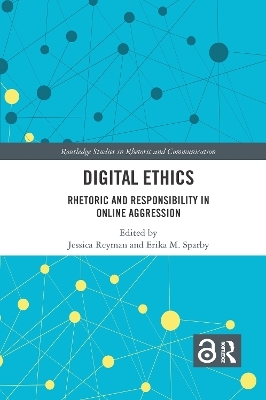
Digital Ethics
Routledge (Verlag)
978-1-032-17757-1 (ISBN)
Digital Ethics delves into the shifting legal and ethical landscape in digital spaces and explores productive approaches for theorizing, understanding, and navigating through difficult ethical issues online.
Contributions from leading scholars address how changing technologies and media over the last decade have both created new ethical quandaries and reinforced old ones in rhetoric and writing studies. Through discussions of rhetorical theory, case studies and examples, research methods and methodologies, and pedagogical approaches and practical applications, this collection will further digital rhetoric scholars’ inquiry into digital ethics and writing instructors’ approaches to teaching ethics in the current technological moment.
A key contribution to the literature on ethical practices in digital spaces, this book will be of interest to researchers and teachers in the fields of digital rhetoric, composition, and writing studies.
Jessica Reyman is Associate Professor of Digital Rhetoric and Professional Writing in the Department of English at Northern Illinois University, USA. Her research focuses on law and ethics in digital rhetoric, and she has published the monograph The Rhetoric of Intellectual Property: Copyright Law and the Regulation of Digital Culture (Routledge,2010), as well as numerous peer reviewed articles and book chapters. Erika M. Sparby is Assistant Professor of Digital Rhetoric and Technical Communication at Illinois State University, USA. Her research interests include online aggression, memes, identity, and digital ethics, and her work has appeared in Computers and Composition. Her dissertation, Memes and 4chan and Haters, Oh My! Rhetoric, Identity, and Online Aggression, won the 2017 Hugh Burns Best Dissertation Award.
Foreword: Friends, Enemies, and Strangers Online 1. Introduction: Toward an Ethic of Responsibility in Digital Aggression Part I: Ethics of Interfaces and Platforms 2. Hateware and the Outsourcing of Responsibility 3. Values vs. Rules in Social Media Communities: How Platforms Generate Amorality on reddit and Facebook 4. Finding Effective Moderation Practices on Twitch 5. A Pedagogy of Ethical Interface Production Based on Virtue Ethics Part II: Academic Discourse in Digital Publics 6. Feminist Research on the Toxic Web: The Ethics of Access, Affective Labor, and Harassment 7. Maybe She can Be a Feminist and Still Claim her own Opinions? The Story of an Accidental Counter-Troll, A treatise in 9 movements 8. Professorial Outrage: Enthymemic Assumptions Part III: Cultural Narratives in Hostile Discourses 9. Hateful Games: Why White Supremacist Recruiters Target Gamers and How to Stop Them 10. Theorycraft and Online Harassment: Mobilizing Status Quo Warriors 11. Volatile Visibility: How Online Harassment Makes Women Disappear Part IV: Circulation and Amplification of Digital Aggression 12. Confronting Digital Aggression with an Ethics of Circulation 13. The Banality of Digital Aggression: Algorithmic Data Surveillance in Medical Wearables 14. Fostering Phronesis in Digital Rhetorics: Developing a Rhetorical and Ethical Approach to Online Engagements
| Erscheinungsdatum | 01.10.2021 |
|---|---|
| Reihe/Serie | Routledge Studies in Rhetoric and Communication |
| Verlagsort | London |
| Sprache | englisch |
| Maße | 152 x 229 mm |
| Gewicht | 362 g |
| Themenwelt | Informatik ► Grafik / Design ► Film- / Video-Bearbeitung |
| Sozialwissenschaften ► Kommunikation / Medien ► Kommunikationswissenschaft | |
| Sozialwissenschaften ► Kommunikation / Medien ► Medienwissenschaft | |
| ISBN-10 | 1-032-17757-8 / 1032177578 |
| ISBN-13 | 978-1-032-17757-1 / 9781032177571 |
| Zustand | Neuware |
| Haben Sie eine Frage zum Produkt? |
aus dem Bereich


